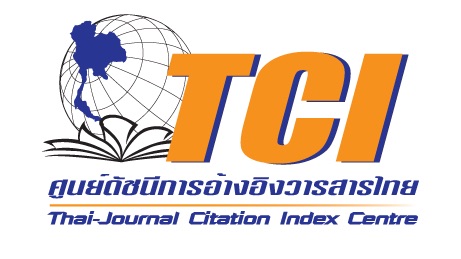Pre-School Child Emotional Development Promotion Through the Local Wisdom of Thai-Khmer Ethnic Groups
Keywords:
pre-school children, child rearing, the Mon-Khmer ethnic groups, Emotional developmentAbstract
The objective of this research is to study the traditional and the procedure to treat the pre-school children rearing practice that promote emotional development of Thai-Khmer ethnic groups. The samples of this study were selected purposively. The qualitative research methodology was employed in this study. The data were collected through in-depth interviews and participatory and non-participatory observations. The study found that, according to the ethno psychology for pre-school childcare, traditions and rituals, considered as the beliefs and taboos have been inherited until nowadays. Every new-born child is protected by “Khru” and have to make “Juam” to worship “Khru”. When a child is one month old, the ritual of “KonPhomfai” will be conducted. Boys will ordain to study Buddhism and learn moral standards. According to foods and breastfeeding, a child would feed from mother’s breast milk, dine together for the whole family that make a child feels warmth; it can promote development and emotional stability. According to causes of illness and illness prevention that taking children to a temple for sermon listening children will be treated with herbs. Children live based on the religious precepts or the practice of a mental restraint (e.g. Sacred objects, amulets). Sometimes, children will be taken to a divination ceremony to find out a cause of sickness or to be sprinkled with the holy water. It can makes children to have tranquility and good mental health.. In term of children’s recreation, Mother will sing a lullaby for the children to sleep. Giving features freely in the community, Compliments and encouragement to play make children happy, confident and have emotional stability as they grow up. As a result, of this study would be leaded to the integration health promotion of pre-school children of the Mon-Khmer ethnic groups that use a Khmer language as a mother tongue.
References
กัลยา ทองธีรกุล. (2559). การส่งเสริมสุขภาพและพัฒนาการทารกแรกเกิดด้วยแนวคิดจิตประภัสสร. ขอนแก่น: ศูนย์อนามัยที่ 7.
โกมาตร จึงเสถียรทรัพย์. (2549). พหุลักษณ์ทางการแพทย์กับสุขภาพในมิติสังคมวัฒนธรรม. กรุงเทพฯ: พิมพ์ดี.
คณะกรรมการฝ่ายประมวลเอกสารและจดหมาย. (2544). วัฒนธรรมพัฒนาการทางประวัติศาสตร์เอกลักษณ์และภูมิปัญญาจังหวัดศรีสะเกษ. กรุงเทพฯ : โครงการจัดทำหนังสือเนื่องในโอกาสพระราชพิธีมหามงคลเฉลิมพระชนมพรรษา 6 รอบ.
คณะกรรมการศาสนาเพื่อการพัฒนาสุรินทร์. (2553). รวมประเพณีและพิธีกรรมท้องถิ่นในจังหวัดสุรินทร์. ม.ป.พ.
คณะกรรมการส่งเสริมการพัฒนาเด็กและเยาวชนแห่งชาติ. (2561). แผนพัฒนาเด็กและเยาวชนแห่งชาติฉบับที่ 2 พ.ศ. 2560 – 2564. (พิมพ์ครั้งที่ 2). กรุงเทพฯ: เจ. เอส. การพิมพ์.
ชดาพิมพ์ เผ่าสวัสดิ์. (2559). คู่มือการเสริมสร้างความผูกพันทางอารมณ์ สำหรับเด็กวัยแรกเกิด – 5 ปี ด้วย กิน กอด เล่น เล่า. กรุงเทพฯ: บียอนด์ พับลิสซิ่ง จำกัด.
ณัฐกร อินทุยศ. (2556). จิตวิทยาทั่วไป. กรุงเทพฯ : วี.พริ้น (1991).
นิตยา ศรีมกุฎพันธุ์ และคณะ. (2555). การละเล่นพื้นบ้านเด็กกลุ่มชาติพันธุ์ไทย – เขมร. (วิทยานิพนธ์หลักสูตรปรัชญาดุษฎีบัณฑิต) สุรินทร์: สาขาวิชายุทธศาสตร์การพัฒนาภูมิภาค(การศึกษาและการจัดการภูมิปัญญา)มหาวิทยาลัยราชภัฏสุรินทร์.
ประกอบ ผลงาม. (2538). สารานุกรมกลุ่มชาติพันธุ์เขมรถิ่นไทย. สถาบันวิจัยภาษาและวัฒนธรรมเพื่อพัฒนาชนบท มหาวิทยาลัยมหิดล.
เปิดสถานการณ์เด็กปฐมวัย.(2557กรกฎาคม). สืบค้นจากhttp://www.banmuang.co.th/
พิทยาภรณ์ สิงหกานตพงศ์ และณัฐวร ดามณีรัตน์. (2555). ทฤษฎีพัฒนาการเด็กปฐมวัย. เอกสารการสอน. อัดสำเนา.
ลักขณา สริวัฒน์. (2549). จิตวิทยาในชีวิตประจำวัน.(พิมพ์ครั้งที่ 2). กรุงเทพฯ: โอเดียนสโตร์.
สำนักนโยบายและยุทธศาสตร์สำนักงานปลัดกระทรวงสาธารณสุข. (2553). กรอบยุทธศาสตร์งานสร้างเสริมสุขภาพและป้องกันโรคระดับชาติปี2554–2558. (พิมพ์ครั้งที่1). นนทบุรี: สามเจริญพาณิชย์.
คณะกรรมการฝ่ายประมวลเอกสารและจดหมาย. (2544). วัฒนธรรมพัฒนาการทางประวัติศาสตร์เอกลักษณ์และภูมิปัญญาจังหวัดศรีสะเกษ. กรุงเทพฯ : โครงการจัดทำหนังสือเนื่องในโอกาสพระราชพิธีมหามงคลเฉลิมพระชนมพรรษา 6 รอบ.
คณะเภสัชศาสตร์ มหาวิทยาลัยอุบลราชธานี.(2559มีนาคม). สืบค้นจากhttp://www.phargarden.com/main.php?action=viewpage&pid=173
Downloads
Published
How to Cite
Issue
Section
License

This work is licensed under a Creative Commons Attribution-NonCommercial-NoDerivatives 4.0 International License.







